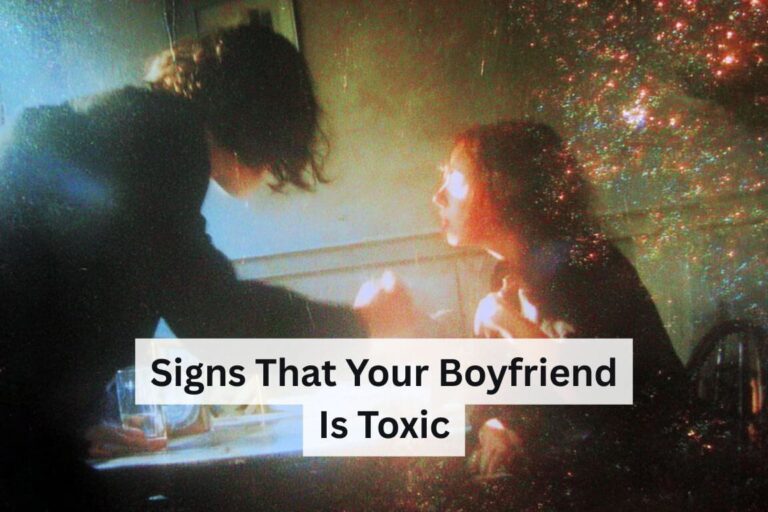Love has this beautiful way of making us see the world through rose-colored glasses.
When butterflies are dancing in your stomach and your heart skips a beat every time he texts, it’s easy to overlook certain behaviors that might not be serving your well-being.
Sometimes what feels like passion can actually be patterns that slowly chip away at your confidence and peace of mind.
Understanding these subtle signs early can save you from months or even years of questioning yourself and walking on eggshells.
1. He Turns Your Wins Into His Losses
A healthy partner celebrates your victories like they’re his own. But when your achievements become a source of tension rather than joy, something’s off balance.
This might show up as sulking when you get a promotion, making sarcastic comments about your success, or suddenly becoming distant when good things happen to you.
True partnership means cheering each other on, not keeping score. If sharing your happiness feels risky because it might trigger a mood shift or argument, that’s your intuition telling you something important.
Watch for subtle comments like “Must be nice to have it so easy” or “I guess some people just get lucky.”
These seemingly innocent remarks are actually ways of diminishing your accomplishments and making you feel guilty for succeeding.

2. The Art of Emotional Chess
Some people have mastered the skill of making you question your own reality. They might “forget” important conversations, deny saying things you clearly remember, or twist situations to make you the villain in stories where you were actually the one hurt.
This sophisticated form of emotional maneuvering leaves you constantly second-guessing yourself.
You might find yourself apologizing for things that weren’t your fault or feeling confused about events you remember differently than he does.
The telltale sign: You start phrases with “Maybe I’m crazy, but…” or “I might be wrong, but I thought…” When you’re constantly questioning your own perceptions, it’s worth examining why.
3. Your Social Circle Becomes His Territory
At first, it might feel flattering that he wants to spend so much time with you. But gradually, you notice friends are seeing less of you.
Family dinners become negotiations. Your hobbies and interests take a backseat to his preferences and schedules.
This doesn’t always look like dramatic ultimatums. Sometimes it’s more subtle: guilt trips when you make plans without him, “jokes” about your friends being bad influences, or scheduling conflicts that always seem to favor his priorities over yours.
Healthy relationships enhance your existing life rather than replace it. If you’re losing pieces of yourself to keep the peace, those pieces matter more than you might realize.
4. The Emotional Investment Imbalance
Relationships require effort from both people, but sometimes you might find yourself doing all the heavy lifting.
You’re the one planning dates, initiating meaningful conversations, and working to resolve conflicts while he coasts along receiving the benefits.
This shows up in countless small ways: you always text first, you’re the one who remembers important dates, you compromise your preferences while his remain non-negotiable.
You might notice you’re constantly giving emotional support but rarely receiving it in return.
The exhaustion is real. When you’re the relationship’s sole maintenance crew, burnout is inevitable. Partnership should feel like teamwork, not a one-person show.
5. Criticism Disguised as “Honesty”
Everyone needs honest feedback sometimes, but there’s a difference between loving truth and constant criticism.
If conversations about your appearance, choices, or personality feel more like performance reviews than supportive discussions, something’s wrong.
This might sound like: “I’m just being honest when I say…” followed by something that makes you feel smaller.
Or comments about your flaws disguised as humor that leaves everyone laughing except you.
Loving honesty builds you up even when it’s challenging to hear. Toxic criticism tears you down while claiming to help.
The difference is usually obvious in how these conversations make you feel afterward.

6. The Disappearing Act
Consistency is the foundation of trust, but some people treat communication like a luxury rather than a necessity.
They might disappear for hours or days without explanation, leaving you wondering if you did something wrong.
When you express concern about this pattern, the response might be defensive: accusations that you’re too needy, clingy, or demanding. Your reasonable need for connection gets reframed as a character flaw.
Emotional availability isn’t optional in healthy relationships. Everyone gets busy, but completely ghosting your partner and then blaming them for being concerned is a serious red flag.
7. Double Standards in Action
Notice if rules seem to apply differently depending on who’s breaking them. Maybe it’s okay when he needs a guys’ night every weekend, but your monthly dinner with friends becomes a source of drama.
Perhaps his past relationships are “complicated history,” but yours make you “damaged goods.”
This selective application of standards often extends to basic respect: his mistakes are understandable oversights, while yours become evidence of deeper character problems.
Fairness in relationships isn’t about keeping perfect score, but it is about mutual respect and understanding.
When you’re held to standards that don’t apply to him, equality has left the building.
8. The Breakup Threat as a Control Tool
Some people use the relationship itself as leverage during conflicts. Statements like “Maybe we should just end this” or “I can find someone else who appreciates me” during normal disagreements are emotional manipulation tactics.
This creates a power imbalance where you become afraid to bring up legitimate concerns because doing so might trigger relationship-ending threats.
You start walking on eggshells, avoiding important conversations to prevent these nuclear options.
Healthy couples work through problems together rather than threatening to abandon ship at the first sign of turbulence.
When the relationship’s existence becomes a bargaining chip, authentic communication becomes impossible.
9. Your Feelings Get a Fact-Check
“Don’t be so sensitive.” “That’s not what I meant.” “Why do you always overreact?” If your emotional responses regularly get dismissed, minimized, or corrected, something important is happening.
Everyone processes things differently, but your feelings are valid regardless of whether they make perfect sense to someone else.
When your emotional reality gets constantly questioned or invalidated, you might start suppressing legitimate reactions.
Your emotions are information, not inconveniences. A caring partner might not always understand your perspective, but they should respect that your feelings matter and deserve attention.
10. The Flirtation Exhibition
Some people seem to forget they’re in a relationship when attractive people are around. This might look like excessive charm with servers, lingering conversations with attractive colleagues, or social media behavior that makes you uncomfortable.
When you express these concerns, you might get accused of being jealous, insecure, or controlling.
Your legitimate feelings about boundary-crossing behavior get reframed as personal inadequacies.
Respectful partners consider how their behavior affects you, especially regarding interactions with others.
Dismissing your concerns while continuing problematic behavior shows a lack of consideration for your feelings.

11. Your Mental Health Becomes the Casualty
Perhaps the most telling sign of all: you notice changes in yourself that worry you.
Maybe you’re more anxious than usual, second-guessing decisions you used to make confidently, or feeling emotionally drained more often than energized.
You might catch yourself making excuses for his behavior to friends and family, or avoiding certain topics to prevent arguments.
Sleep might become elusive, and activities you used to enjoy feel less appealing.
A healthy relationship should generally add to your well-being, not subtract from it. While all relationships involve some stress and compromise, the overall effect should be positive for your mental and emotional health.
Moving Forward with Clarity
Recognizing these patterns doesn’t necessarily mean the relationship is doomed, but it does mean important conversations need to happen.
Some people genuinely don’t realize how their behavior affects others and are willing to grow when it’s brought to their attention.
However, change requires acknowledgment of the problem and consistent effort from both parties.
If discussions about these issues result in defensiveness, blame-shifting, or promises that aren’t followed by action, you have valuable information about your partner’s commitment to growth.
The goal isn’t perfection but rather mutual respect, emotional safety, and genuine care for each other’s well-being.
Trust your instincts when they tell you something isn’t right. Your inner wisdom often recognizes problems before your logical mind catches up.
Remember that love shouldn’t require you to shrink yourself, walk on eggshells, or constantly question your worth.
The right person will enhance your life’s joy, not complicate its peace. You deserve a relationship that brings out your best self rather than making you question if that self is acceptable.
Sometimes the most loving thing you can do for yourself and even for him is to establish clear boundaries about what behavior you will and won’t accept.
Whether those boundaries lead to positive changes or difficult decisions, you’ll know you honored your own worth in the process.


